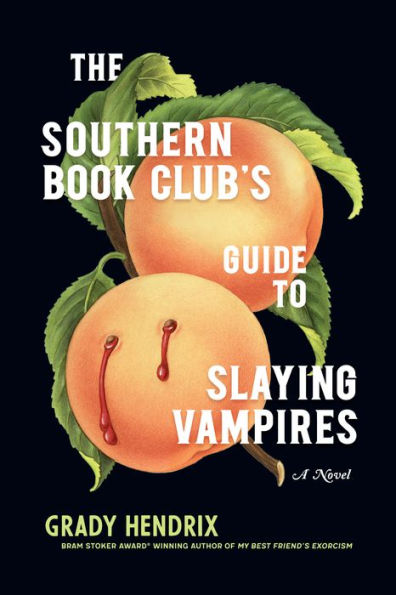Patricia Campbell has done everything right. She was a working woman, and then she got married. She got pregnant—twice!—and delivered two amazing children. The perfect housewife, she moved to a small town to support her husband’s new business… and she’s bored. Terribly so. When her book club splinters and Patricia’s friend picks The Manson Trials over Cry, the Beloved Country Patricia’s boredom abates, at least for a little while.
When Patricia is brutally attacked, leaving her scarred and a dead body twitching in her front lawn, she can’t get over the sense of wrongness. Maybe it’s the true crime novels, maybe it’s women’s intuition, maybe it’s just being unwilling to believe the easiest explanation simply because it’s convenient. But it’s this moment, when Patricia’s ear gets bitten off behind the trashcans, when we realize that this book—done up in Southern propriety and hidden behind vacuumed curtains—is a bloody horror story.
Then a mysterious stranger comes around. He’s handsome, a helpless man stranded in a strange county as he has to deal with his mother’s death. Patricia helps (of course! What good, god-fearing woman wouldn’t aid a stranger in need?) and James Harris finds himself with an ID, a bank account, and an invitation for dinner.
As children start to go missing and strange coincidences line up, Patricia begins to suspect the young, charismatic, wealthy Mr. Harris is more than who he says he is. She goes digging, and while she turns up empty—at first—her book club rallies around her. They’re more than just friends who read books together, they’re sisters. The tension builds, the terror and upset escalating, the Book Club gets all their ducks in line and then… the husbands intervene, and all the suspicions, evidence, testimonies, and even Patricia’s own eyewitness account, are thrown out the window as the menfolk step in to resolve the situation.
This is the crux of the book; the second great turning point. When you realize that it’s not just a horror story, but a story about misogyny, rage, anger, and the indignities that women had to endure in order to survive, to be respectable, to be considered proper women. Grady Hendrix does not shy away from the indignity of women’s lives in the nineties in the south. There is a point where you are listening to a bloodsucking vampire and a well-to-do doctor converse about Patricia, as if she is not there, and you’re left wondering which one of them is the real villain of the story.
It takes a while to get there, but here is the strength of this book. The gory, bodily horror is truly horrific, but the way that grown-ass, capable, responsible women are treated, dismissed, and denied the ability to think for themselves, is what really makes you want to scream. While reading this on public transit I had to shut the book, take deep, calming breaths, and tweet angrily about the sheer, utter injustice of it all. Let’s take a moment.
Dear God, holy protector, is it gay if I scream out "leave him! Murder the vampire, leave your husband, join a coven!!!" Out loud, multiple times, on a crowded train, while reading?
Asking plaintively for a friend.
— lin codega, rascal era (@lincodega) March 5, 2020
Everything about the believability of this control narrative was horrific to read, but compelling. The knowledge that women were treated like this—real women, their lives utterly under their man’s thumbs. These were the monsters in our bedrooms. The serial killers of Helter Skelter and The Stranger Beside Me weren’t vampires, they were the husbands.
One of the parts of this book that is simultaneously frustrating and appreciated is the way that Hendrix speaks about the treatment of Black people in the South during the late ’90s. While it was little more than a surface level exploration, there were points where it really seemed like the white women at the core of this story truly understood the harm they had done by their inaction. Black communities were shattered over the course of this book, and Book Club doesn’t ignore the intersection of classism and racism that makes this community vulnerable. The book itself tries very hard to make the white women aware of their complicit systemic racism and harm that they inflict on the Black community, but without a deeper inspection of the Black characters and problems, it feels at points like a literary bromide.
There is no glossing over the problems of the Black community and Black people in the South, and it’s no different in Book Club. In the novel, it’s the Black children who go missing, get killed, and are sent away to live in the North. The white women are protected and safe… as long as they follow the rules. Black women don’t get that privilege. There is a self awareness in Hendrix’s writing, as if he knows that there should be more, that this representation, this white guilt, is not enough. The saving grace that makes this issue just a snag and not an unravelling, is that Patricia is the main point of view character, and we follow her unflinchingly. She is a guilty bystander and she knows it. It weighs on her. Guilt is not enough, but for Book Club, it feels like enough to hold the book together.
Buy the Book


The Southern Book Club’s Guide to Slaying Vampires
Hendrix is a master of characterization. The members of the Book Club are all beautifully faceted and sharp, tart and prim and proper, and all at once fierce and furious. They are also peak Southerners. They return a borrowed Pyrex dish with a casserole inside. They are charming and hard-working, and they quote scripture and kill chickens with their bare hands. At one point when Patricia reveals her theory about James Harris, one of them pulls out a bible, quotes Proverbs and the Ephesians, turns to Patricia and says “I knew my test would come. I knew that one day my Lord would set me against Satan, and try my faith in battle against his snares, and this is just so exciting, Patricia.”
I will stress, one more time, that while this book has a soft start, which feels like it will be a slow ramp up to desiccated horror fest, it is instead a fireworks display. It lulls you into watching, waiting for the horror, and when it comes it is startling, visceral, disturbing, and hard to read. Like all great fireworks shows, the horror is not easy to predict, and it’s hard to watch without flinching. This isn’t your mother’s vampire story. (Well… maybe not yours.)
The book is an examination of personhood when you have carved yourself up in order to serve those around you, to be their person in addition to being your own. Book Club asks what it means to be a woman in a relationship with a man, what women owe to men, and their children, their families and their communities. The book is strangely timely, as it does focus on a parasite killing the vulnerable in a community, and the women only succeed when they band together. The neighborhood protects its own, even at the expense of other neighbors. It’s a brutal book, and the happy ending comes at a high cost. Book Club lures you in with the bucolic setting, charming women, and Southern affect, but when it turns, it does a hairpin one-eighty, goes and spins sedys in the police parking lot while screaming obscenities, then turns around and delivers the vigilante-style vindication that we—and Patricia—so desperately deserve.
Content Warnings for this book: CSA, Rape, Spousal Abuse, Misogyny.
The Southern Book Club’s Guide to Slaying Vampires is available from Quirk Books.
Linda H. Codega is an avid reader, writer, and fan. They specialize in media critique and fandom and they are also a short story author and game designer. Inspired by magical realism, comic books, the silver screen, and social activism, their writing reflects an innate curiosity and a deep caring and investment in media, fandom, and the intersection of social justice and pop culture. Find them on twitter @_linfinn.










